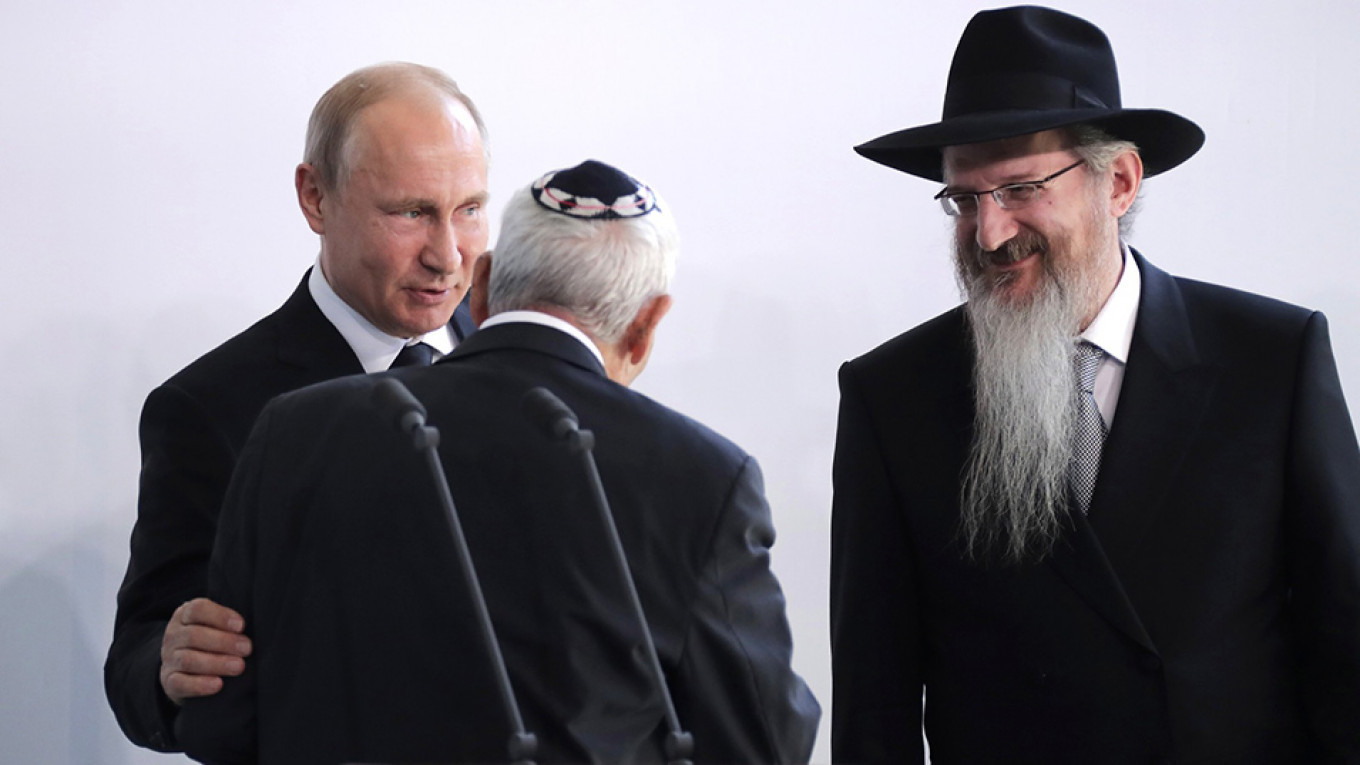
Putin, with Russia’s chief rabbi Berel Lazar, right, has fashioned himself as a backer of Russia’s Jewish community Mikhail Metsel / TASS
Howard Epstein – LETTER FROM ISRAEL: Russia and Jews
If there is one bilateral relationship that Jews have had to endure, rather than enjoy, over the centuries, it has been that with the Russians. In 1827, Nicholas I proclaimed his Statute on Conscription Duty. Jews were rendered liable to serve in the Russian army and the privilege of paying a ransom in lieu was ended. The shetele were denuded of young men. Often taken at the age of 12 – just as they were looking forward to their barmitzvah, of course – they were not released until the age of 37. The Russian army worked them mercilessly, and often to death. It is understandable, therefore, that in Fiddler on the Roof, Tevye prays to Hashem, “May G-d bless and keep the Czar. Far away from us.”
For many, the loss of their boys and repeated pogroms were unbearable. In the First Aliyah, from 1882 to 1903, around 30,000 Jews from Russian territories made their way to Ottoman-controlled Palestine, seeking a life free of degradation and persecution. In the Second Aliyah, between 1904 and 1914, a similar number took the same escape route. The greatest migration, however, involved some 2.8 million Jews who left Russian lands for the New World. Between 1880 and 1910, they arrived in New York as a seemingly endless stream of humanity borne on the high seas to they knew not what, except that nothing could be as pernicious for them as Russia.
Other Russian Jews put their faith in politics. In the sealed train in which Lenin had been despatched by the Germans to Russia, amongst the 29 comrades 17 were Jews, as were 10% of the communist political elite of some 3,000 at the start of the 1918 October Revolution. Many Jews throughout Russia and the Pale of Settlement were communist activists or sympathisers. They could not imagine that life could be as bad in a communist future as it had been under the czars.
In the Great Patriotic War (1941-1945), at least half a million Jews, around 20% of the Jewish population of the USSR, served in the Soviet military. Less than two thirds of them returned home.
You might think that a praiseworthy contribution to the war of survival that the Russians fought but, within five years after the War, Stalin had decided that there was a conspiracy (“the Doctors’ Plot”) of prominent Soviet medical specialists – mostly Jews – to murder leading government and party officials. Stalin intended to use the upcoming trial to launch a massive purge of party-members but (many would say) fortunately by March 1953 he had gone to meet his Maker. That this brought little improvement in the lot of the Jews of Russia became increasingly plain, as by the 1970s the words “Jew” and “Refusenik” were almost synonymous and, as the Soviet Union imploded in 1989, what had started as a trickle towards Israel became a flood.
By 2006, some one million Jews had arrived in Israel from the former Soviet Union, thus replicating the massive scale of Russian immigration to America.
No one expected to see the Abraham Accords in his lifetime, yet they happened and will bring immense wealth, and peace, to the Middle East and the Gulf. This signifies a seminal moment in Jewish history. But it is not the only one.
It was thought that Netanyahu’s USP was not only that he had survived the blatant antipathy of Obama but also that he had, in parallel, maintained an excellent working relationship with the current czar of Russia, Vladimir Putin. “Who else could do that?” Israelis wondered. Now we have the answer. Prime Minister Bennett went to see Putin last week. The encounter was expected to last a couple of hours but such was the chemistry between them that they enjoyed each other’s company for nearly three times as long.
The key is to be found not merely in the camaraderie that the two leaders engendered, but also in Putin’s formal welcome: “Israel has what is probably the biggest Russian-speaking community outside of Russia, which includes many surviving veterans of the Great Patriotic War, and we feel special warmth towards these people.” At last a czar who is not only not antagonistic to Jews but positively enjoys relationships with them at many levels! Of course, Russia maintains relations with states that are plainly hostile to Israel but knowing we have a sturdy, direct line to the Kremlin is highly significant.
A few years ago, I spent Rosh Hashanah in St Petersburg, attending the Grand Choral Synagogue. I was struck by many things in that wonderful shul, in that magnificent city, but something important was conspicuous by its absence. Jews walked up to and away from shul, and gathered outside on Lermontowskiy Prospect, looking relaxed, rather than over their shoulders, not hurrying – rather dawdling, and certainly not hiding their Jewishness. There may have been some form of security but, if so, it was well hidden. Probably for the first time in history, Russian Jews are at liberty, both in Israel and in Russia too.
© Howard D Epstein








